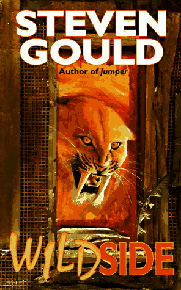

WILDSIDEby Steven GouldTor0-312-852398-9316pp/$5.99/January 1997 |
 |
Reviewed by Steven H Silver
There is a long tradition in science fiction of the juvenile genius. Steven Gould's Wildside is as firmly a part of this subgenre as Robert Heinlein's Rocketship Galileo. In the earlier novel, the kids had an adult mentor, which is completely lacking from Gould's arrangement. The five juveniles in Wildside have just graduated from high school. They have a variety of problems, ranging from absentee fathers (ring-leader Charlie) to single fathers (Vietnamese Clara) to overprotective mothers (Rick) to alcoholism (Idiot Joey). In the last case, I wonder if Texas law actually allows a minor convicted of DWI to retain his driver's license.
Early in the novel, we are introduced to Charlie Newell's scheme to make money. On a farm left to him by his long-missing and presumably deceased uncle, Charlie has found a portal to an alternate Texas which has not been despoiled by humans. His ultimate goal is to mine the land for gold. In order to earn his seed money, he anonymously sells extinct passenger pigeons to four zoos throughout the US.
The early portions of the novel are filled with details concerning how clever Charlie and his friends set up their organizations with the help of a lawyer who does not ask too many questions, and how Charlie enrolls his friends for flight lessons. At times, Gould gives enough information about flight that the reader almost feels they are ready to fly themselves.
The most disappointing part of the novel, however, was characterization. I'm just going to examine two of the characters here. The first is the narrator, Charlie. Charlie is an eighteen year old whose main interest seems to be flying. However, he has a knowledge of how the business world works which demonstrates skills and knowledge which one might expect from a business student or MBA candidate. Furthermore, his knowledge of the business world seems to be that of someone who has worked in offices, not a student who may have had a part time job in an office. Although Charlie makes a few comments about a major weight problem, he never shows any signs of being overweight or out of shape when he finds himself in the Wilderness. Showing good sense frequently, nevertheless, the people he chooses to join him in a major business venture include a good friend and his girlfriend, who Charlie doesn't particularly like and the girl he loves and her boyfriend, who Charlie thinks is an idiot. Charlie is probably the most fleshed out character, although all the characters show signs of contradiction.
The other characterization problem I would like to discuss is the Rogue CIA agent known as Mr. Bestworst. This character, or perhaps, caricature, seems to be drawn from every evil government agent from every bad thriller made in Hollywood over the last decade. He is trying to defend his country and gets upset when Charlie points out he is bucking the Constitution. He acts irrationally in nearly every situation, yet has been given command of a major operation.
Gould never adequately explains how Bestworst's division found out about Charlie's secret or why (and how) they were called up from their operations in Central America. In fact, Gould's complete disregard for explaining the military and CIA's role was the biggest disappointment of the novel. They merely existed as stock villains.
This novel had potential that it did not live up to. Unlike Mona Clee's Branch Point, Gould manages to tell an interesting story (plus airplane stuff), which makes you wonder, for all its flaws, what is going to happen next. However, I couldn't help feel that if Gould could have left out a lot of the background information: day to day operations, flying, business, and flesh out the characters more logically, this could have been a very good novel.
Purchase this book from  . Hardcover
. Hardcover
Purchase this book from  .Paperback
.Paperback
